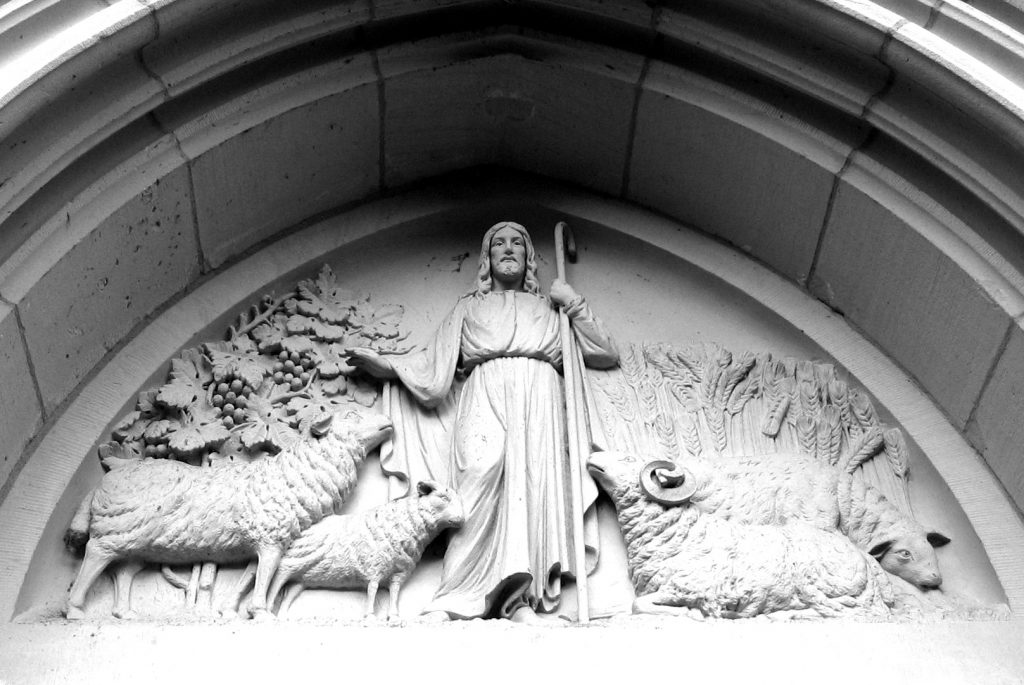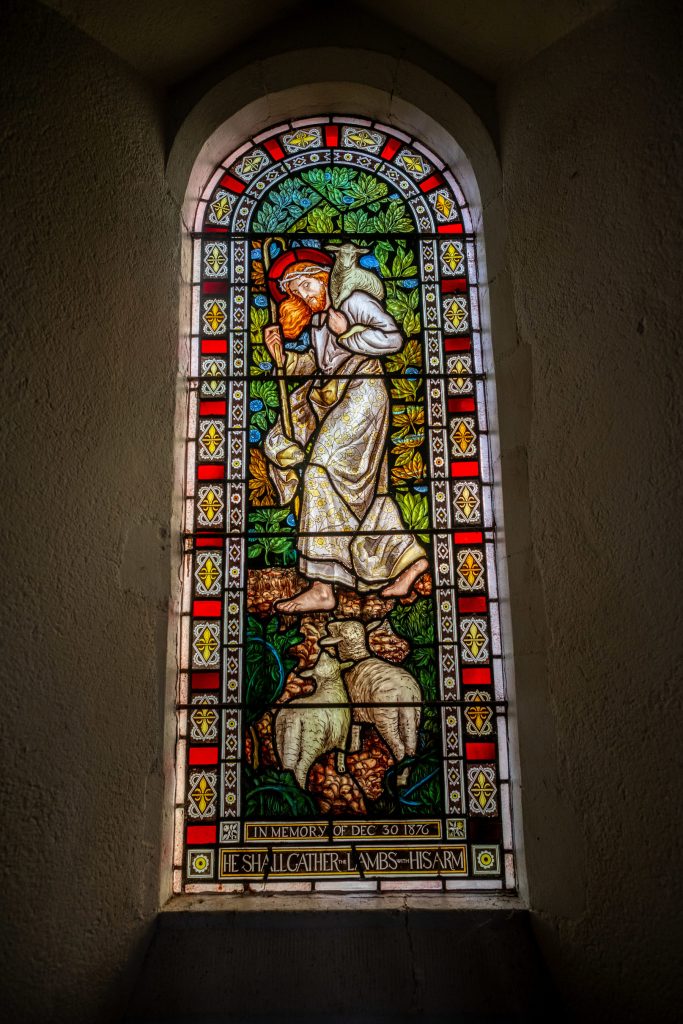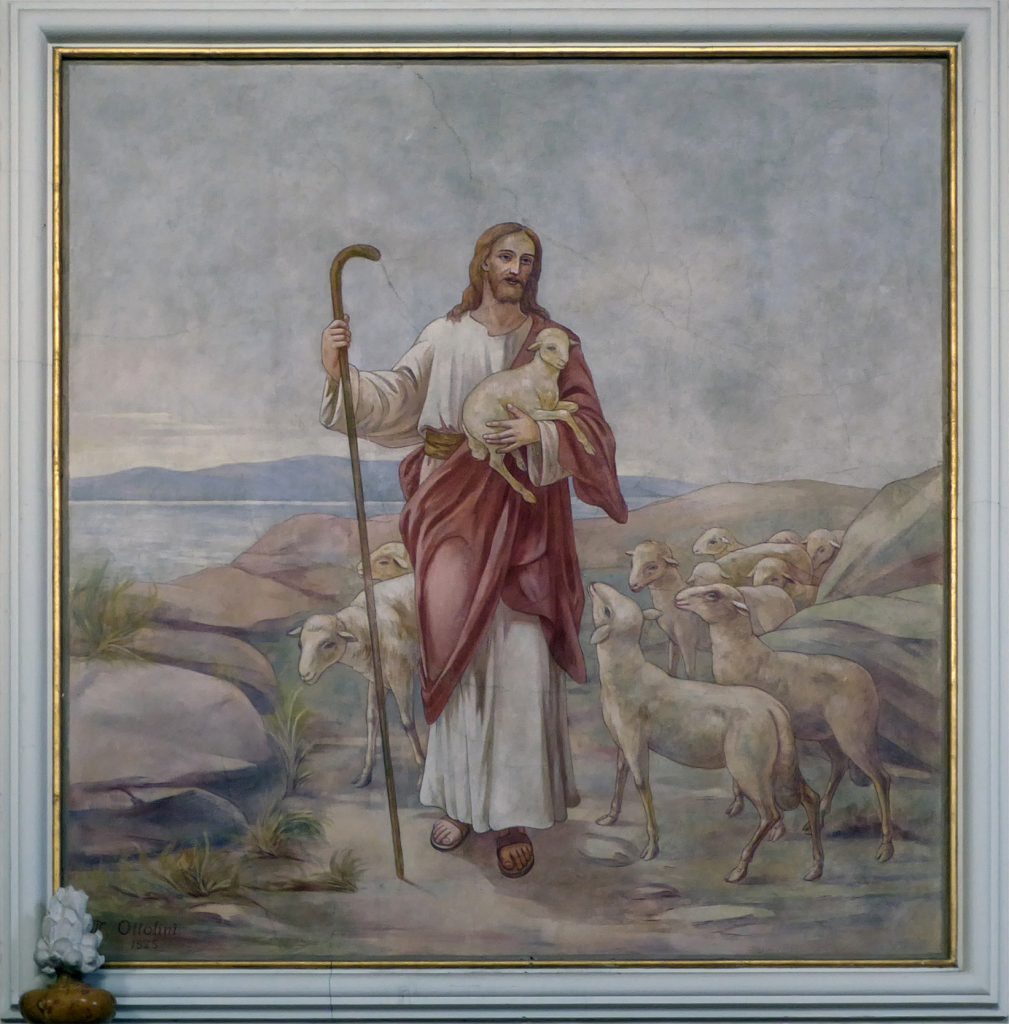The Good Shepherd
by Jim Chimirri-Russell

Jesus, the Good Shepherd: Hermann Jess, 1904. (Friedenskirche in Hanau, Germany)
The Lord is my shepherd,
I shall not want.
He makes me lie down in green pastures.
He restores my soul.
He leads me in paths of righteousness
for His name’s sake.
Even though I walk through
the valley of the shadow of death,
I will fear no evil,
For You are with me;
Your rod and Your staff they comfort me.
You prepare a table before me
in the presence of my enemies;
You anoint my head with oil;
My cup overflows.
Surely goodness and mercy shall follow me
all the days of my life,
And I shall dwell in the house of the Lord
forever.
Such is the 23rd Psalm, and it is one of the most well-known passages in the Scriptures. It is so well known, in fact, that if someone knows nothing else of the Bible, they will likely have heard this passage. It is a staple at funerals, and apart from John 3:16 and the Lord’s Prayer, it is the most widely heard and read passage in the Bible.
It is also important for us to remember this passage when we think about Jesus referring to himself as the Good Shepherd. We so often forget that the people of Israel were very well acquainted with what we call the Old Testament—much more so than we Christians are today. When Jesus calls himself the Good Shepherd, He is tying himself into something bigger and more important than just making an illustration or metaphor about Himself.
So what is Jesus saying when He calls Himself the Good Shepherd? He is calling Himself God, by using language God uses about Himself. When David talks about the Lord in Psalm 23, in words that would echo down through the centuries, He does so by talking about the Lord as shepherd: one that will save, comfort, and protect His sheep. But while the 23rd Psalm is the best known of the passages about the Lord as Shepherd, it is not the only one. There are more, and they are more pronounced.
So what is Jesus saying when He calls Himself the Good Shepherd? He is calling Himself God, by using language God uses about Himself.
Jesus, speaking of Himself as the Good Shepherd is drawing back to Psalm 23, of course, but also to the book of Ezekiel. In chapter 34 of that book, God makes a promise to His people that He himself will be their shepherd. There have been shepherds before, of course, but those shepherds have been cruel, evil, and wicked. They have sought to fleece, kill, and devour the sheep. God has seen His people groaning under the leadership of these evil shepherds, and so has decided to take charge of the situation himself. To do so, He steps into our world, into our history, and leads His sheep. When he speaks to them, they know His voice, and follow where He leads. And where does He lead? He leads them to the cross, to the site in which He makes things good and right between human beings and God.

The Good Shepherd: St. Giles Church, Houghton St. Giles, 1876
For those of us who are living today, we need the Good Shepherd more than ever. We need to listen to His voice and to follow where He leads. Right now, there is more misinformation than ever before. There are hundreds of voices pulling in a hundred different directions. There are people everywhere who all sound authoritative in their own way, and all have in mind a different direction you should go. But Jesus is different. He is different because He does not lead you in any direction for His own sake, but rather for yours. He isn’t here to fleece the sheep, nor to kill or eat them; He is here to lead them in paths of righteousness, and to have their cups overflow.
But to do that, He will have to have His rod and His staff. During the times we are living in, it is helpful to think about how the Good Shepherd goes about being good. He does so by using His rod and His staff, two tools that are necessary for the work shepherds do. How are these two things different? The rod is a walking stick, of course, but it is also the club or cudgel used to attack predators and to discipline the wayward. This tool was how the shepherd protected the sheep from outside sources—and we frequently call upon God to do that with us too. We want Him to protect us from all the problems and plagues that are around us. We want Him to protect us from the devil, from the world, from whatever dark forces may be assailing us. Frequently, then, when we appeal to the Lord our God for help, it is to protect us from those things that are outside us.
But He does not only carry the rod; He also carries the staff. And the staff, or crook, is used in quite a different fashion. On the side of our church in Regina, we have a very large wooden shepherd’s crook, visible to anyone who may be going past us. The crook, the shepherd’s staff is what the shepherd uses to save the sheep not from forces outside themselves, but from themselves. When Jesus discusses sheep in Matthew 18, He does so by asking: “What do you think? If a man owns a hundred sheep and one of them wanders away, will He not leave the ninety-nine on the hills and go look for the one that wandered off? And if He finds it, truly I tell you, He rejoices more over that one sheep than over the ninety-nine that did not go astray.” Where will He find that sheep? Well, in Matthew 12, Jesus says: ‘If one of you has a sheep and it falls into a pit on the Sabbath, will he not lay hold of it and lift it out?”
When we think about the Good Shepherd, His rod and His staff, the comfort is not just that He is there to protect us from dangers outside us, but that He is there to protect us from ourselves as well.
When we think about the Good Shepherd, His rod and His staff, the comfort is not just that He is there to protect us from dangers outside us, but that He is there to protect us from ourselves as well. In fact, that is the greater protection that is needed. Sheep are likely to wander away, to wander off, to follow each other, and to stroll happily into danger. If you’ve ever spent much time with domesticated animals, you will know that they absolutely need to be watched very closely and carefully, fenced in and managed, lest they end up killing themselves. And so, too, we need to be carefully watched and managed by the Lord our God. Most of us don’t think about how much we need to have God protect us from ourselves, but we really, genuinely do. A large part of the comfort that is to be found in Christ as the Good Shepherd is that He is there to pull us out of our bad decisions, to bring us out from where we have gone wrong, and to stop us from trying to do so in the first place.
Think about this: who is it that is happy to see sheep wandering wherever they’d like? Who is it that is delighted for the sheep to go wherever seems good to them? Is it a caring shepherd, or is it the wolf?
Think about the various orders that have come forward during this pandemic that we are in. Think of the events that are closed down, the places that you haven’t been allowed to go: that’s because we need to be protected from ourselves, from where we would wander if we were allowed to do so freely. In the same way, we call to the Lord to be our Good Shepherd, who will protect us from ourselves. His Word is full of advice, of guidance for us and for our lives, to keep us safe and to give us abundant life. We don’t want to listen most of the time, though His word is good. We’d rather not listen too closely, because what He commands restricts us from what we want to do.

The Good Shepherd: Vicent López Portaña, c. 1800.
But think about this: who is it that is happy to see sheep wandering wherever they’d like? Who is it that is delighted for the sheep to go wherever seems good to them? Is it a caring shepherd, or is it the wolf?
The Good Shepherd can’t keep us safe from the forces outside us if He does not keep us safe from ourselves as well. All of our pleading to have Him protect us from the devil, from the world, from the consequences of what we do are no good if we are not also being protected from ourselves, from wanting to get into those situations in the first place. And we have to remember that the Lord disciplines those whom He loves. His discipline of us is proof that He loves us very much.
In Ezekiel 33, beginning at verse 10, it says: “Thus you have said, ‘Surely our transgressions and our sins are upon us, and we rot away because of them. How then can we live?’ Say to them ‘As I live, declares the LORD God, I have no pleasure in the death of the wicked, but that the wicked turn from his way and live. Turn back, turn back from your evil ways, for why will you die, O house of Israel?’”
The rod and staff of the Shepherd comfort us because His protection and His discipline are the signs and marks of His love. When we find comfort in Him being the shepherd, we need to remember what a shepherd does. The shepherd protects the sheep from predators, prevents the sheep from hurting themselves, leads them where they should go, and finds and seeks them when they have wandered off. In a passage that is extremely well known, that is universally loved, we need to remember what it is that we ask the Shepherd to do. And once we have worked that out, then we can rejoice fully in His use of the rod and the staff as He keeps the sheep of His pasture safe. Once we trust Him in that, then we will listen to His voice all the more.
———————
Rev. Jim Chimirri-Russell is pastor of Good Shepherd Lutheran Church (Regina, Saskatchewan).





